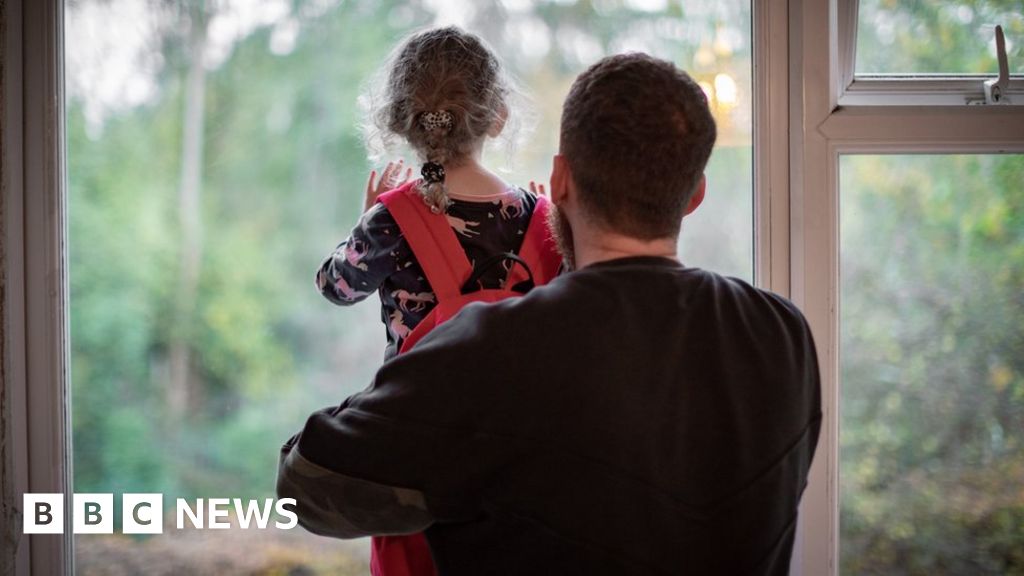- By Rhodri Lewis
- BBC Wales Political Correspondent
Image source, Save the Children
More than a quarter of children in Wales were living in poverty in 2021-22
Wales could cut child poverty by introducing Scotland’s £25 per week payment for poor families, experts have said.
The Scottish Child Payment is having a substantial effect on child poverty levels, according to Oxford University and the Joseph Roundtree Foundation.
The payment, introduced in 2021, can be claimed by families on Universal Credit and about 300,000 children get it.
The Welsh government said it had no control over social security in Wales.
In Scotland, children are entitled to £25 a week, regardless of how many children there are in a family. This means families get a total of £1,300 per child each year.
Every child under the age of 16 is entitled to it and other benefits are not affected by families receiving the money.
Image source, Getty Images
Scotland has its own benefits system, making it easier to target families who need it
Chris Birt, associate director for the Joseph Rowntree Foundation in Scotland, said it had been a huge help for families, who told the charity “it allows us to put the heating on in October”.
He added: “But anyone who’s got kids will understand kids want to be out with their pals, they want to be involved in activities around the schools.
“They want to go and play football, do dancing, do art, whatever it is, and the Scottish Child Payment will also say to parents ‘well you do have that extra few quid this week for your child to be able to go out with their pals on Saturday’… and so it makes a real practical difference.”
Prof Danny Dorling of Oxford University said the Scottish payment was the most significant attempt to tackle child poverty seen anywhere in Europe since the fall of the Berlin Wall.
“It is clearly the most direct way to help people. The parents of children, and especially their mothers, are the people who have their interests most at heart,” he said.
“So any talk that says that some other method is better, is going against all the evidence that we’ve collected for decades, which says you have to hand money directly to the families of those who are poorest. They use it most wisely.”
But the Scottish Child Payment carries a hefty bill – about £428m in the current financial year out of a Scottish budget of nearly £60bn.
Scotland has its own benefits system, making it easier to target families who need it whereas Wales does not.
What do the politicians say?
The Welsh government said: “Unlike Scotland, the Welsh government does not have the legislative powers to enable us to make a payment similar to the Scottish Child Payment, as powers over social security remain with the UK government.
“We have repeatedly called on the UK government over the last 13 years to do more to live up to their responsibilities and support families on lower incomes in Wales.
“We continue to do all we can to support people through the cost-of-living crisis by providing targeted help to those who need it most. During 2022-23 and 2023-24 this support is worth more than £3.3bn.”
But Prof Dorling said it could be brought in in Wales, perhaps paid via councils, if ministers wanted to do so.
He said: “In Scotland in began with only £10 a week and only for children under the age of six, and if it were to happen in Wales, I would expect it would begin, first of all with that. It’s really not a question of money.”
Welsh Conservative social justice spokesman Mark Isherwood said: “It is important to review and examine any new evidence that is presented to help end child poverty and until the evidence is appropriately scrutinised, we cannot say whether the additional £25 payment would be beneficial or not.
“Since devolution the Labour government have thrown billions of pounds into eradicating child poverty yet the parts of Wales with the highest child poverty before devolution continue to have the highest levels of child poverty today.
Plaid Cymru spokeswoman for social justice and equalities, Sioned Williams, said: “Plaid Cymru is fully supportive of a Child Payment system, like the approach taken in Scotland, as this is proven to be effective in lowering child poverty rates.
“One in three children in Wales are living in poverty. Tackling this injustice is fundamental to the type of Wales that Plaid Cymru wants to see, where the harms of poverty are eradicated.”

William Turner is a seasoned U.K. correspondent with a deep understanding of domestic affairs. With a passion for British politics and culture, he provides insightful analysis and comprehensive coverage of events within the United Kingdom.








